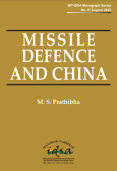Sino-Indian Relations: Are Trade Issues Likely To Cause Even More Problems?
The Indian political class should seriously ponder without engaging in fruitless ideological debates – for we may be leaving ourselves with no choice – whether to acquiesce to a China-dominated commercial and economic landscape in Asia.
- R. S. Kalha
- December 24, 2012











